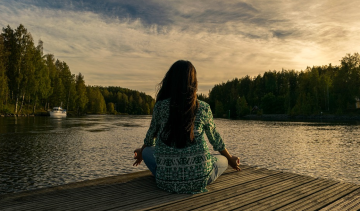The pandemic has forced many of us to stay at home and socially distance from our friends and family. Although, in some ways, it is a privilege that many of us have the resources and ability to safely self-isolate in the comfort of our own homes, feelings of loneliness may foster and you can feel disconnected from others and the outside world.
A review of research on loneliness found that it has been linked to higher rates of mortality as well as poorer mental health outcomes, such as anxiety and depression. This illustrates just one of the ways the virus may significantly impact us as a society.
What can we do to cope with feelings of loneliness?
An important first step is to create acceptance, and an understanding that this situation is mostly out of our control. This allows us to adjust our expectations temporarily for the days and weeks to come, and so we can take the first steps into making the best out of it and reducing feelings of loneliness.
Keep yourself busy
A factor that can contribute to feelings of loneliness and anxiety is periods of boredom and rumination. By keeping yourself occupied it can give you some more structure, help you stop thinking about the negative things, as well as increasing your sense of self-accomplishment each day. A loss of sense of meaning and purpose can add to these feelings of loneliness and depression. Therefore it is important to do something each day you regard as meaningful, this will help you look forward to each day and remain content.
Other examples of activities you can do to keep busy are:
- Take part in some exercise, such as running, yoga or a dance class at home.
- Read a book.
- Play a computer game.
- Learn something you never had the time for before.
- Start an art or music project.
Be creative
Expressing yourself creatively, whether you do it through drawing, painting, making music, or decorating, can be therapeutic in itself, and a good way of getting out your negative feelings. Creating and problem solving can help us to be mindful. This can reduce our blood pressure, muscle tension and our heart rate helping us feel more relaxed.
Not only that but if you share your creative endeavours with others, people may enjoy or even relate to them. This allows you to connect with others in a different way then you might normally.
Go outside
Depending on your government’s advice regarding the pandemic, it can be greatly beneficial and grounding to go outside. By seeing other faces and people going through the same experience it can be a greatly comforting and connecting experience, reducing feelings of loneliness, despite the social distance.
Studies have found that going into nature can reduce levels of cortisol which contribute to feelings of stress.
Help someone else
Someone else out there is probably having a similar experience to you, and may be struggling with the current pandemic. It can be rewarding to extend some of this understanding to someone else and try to provide a helping hand. You may be working on yourself but it can help to take the focus off your own loneliness and be there for someone else. It could be your neighbour or an old friend, try to think of someone you know who could use some extra support or company.
Stay connected online
In this day and age, there are numerous different ways for us to stay connected online. Here are some examples:
- Set up a video call with family and friends.
- Join a social media community about a subject you are interested in.
- Join an online forum about a hobby of yours.
- Communicate with friends on social media.
- Play games together online with friends.
- Participate in ‘QuarantineChat’, this was set up specifically to help people connect during the pandemic.
Are you struggling with loneliness during the pandemic? Don’t hesitate to reach out to professional help, we are here to help.











